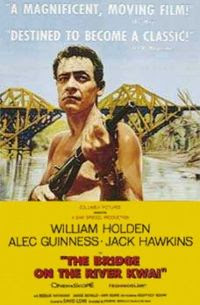It is now 50 years since this multiple-award winning film was released. The movie depicts the treatment of prisoner of wars of British origin by the Japanese in Burma. The movie won a lot of praise and critical acclaim for the sheer richness of the theme and treatment, as well as setting a high standard for war movie. The movie takes the story forward in some detail, building the plot and keeping viewers hooked, although modern day viewers who watch action movies that have fast car chases, massive explosions, and other such fast action may find the pace of the movie a bit slow. However, 'The Bridge on the River Kwai' is regarded as one of the top 100 movies of all time; it is only when you watch it that you realize that the movie is gripping, building up the story till the final climax.
The Japanese army wants the captured British soldiers to build a strategic bridge, and the senior English officer wants to make it difficult for the Japanese to fulfill their mission. However, in a twist, his obsession with proving the capability of the British lead him to a mission that is actually supporting the enemy. It is only near the end that he comes out of this craziness and reverses himself. Historically, the Japanese army did not have a good record of treatment of Prisoners of War in the Second World War, not very concerned with following the rules of war with regard to treatment of Prisoners of Wars. For an example, refer to the account of the Bataan Death March.
The movie was a multiple Academy award winning movie, winning 7 Oscars out of a total of 8 nominations. The awards won were:
Best Director - David Lean
Best Actor - Alec Guinness
Best Cinematography - Jack Hildyard
Best Picture - Sam Spiegel
Best Film Editing - Peter Taylor
Best Music - Malcolm Arnold
Best Adapted Screenplay - Carl Foreman & Michael Wilson (Honored posthumously in 1984) and Pierre Boulle
In addition, Sessue Hayakawa was nominated for Best Supporting Actor.
At that time, director David Lean was not very well known in the United States, being known primarily in England. After 'The Bridge on the River Kwai', he made many acclaimed movies, such as Lawrence of Arabia, Doctor Zhivago, and A Passage to India, and became counted as one of the greatest directors. He had made a string of movies before this movie, but it was The Bridge over the River Kwai that gave him a lot of fame and built his reputation.
The movie is a very intense movie, and boasted of some great actors to play the different characters:
Alec Guinness as Lieutenant Colonel Nicholson
Sessue Hayakawa as Colonel Saito, the prison camp commander
James Donald as Major Clipton, the medical officer
Ann Sears as the nurse at the hospital in Ceylon where Shears recuperates
William Holden as US Navy Commander Shears
Jack Hawkins as Major Warden, a British commando officer
The movie is essentially about the senior British officer of the POW, Colonel Nicholson (Alec Guinness). The POW are in a camp deep in the Burmese jungle run by the Japanese Colonel Saito (Sessue Hayakawa). He is under orders to build a vital railway bridge, and his honor is at stake. When he orders the POW's to build the bridge, Colonel Nicholson refuses to let his officers be part of the labour since they are exempt as per the Geneva conventions. Even after some severe treatment by the Japanese, Colonel Nicholson refuses, earning the respect of his men.
However, after forcing the Japanese officer to break, Colonel Nicholson agrees to help in getting the Bridge built, seeing it as a way to show the capability of the Bridge. He even improves upon the Japanese design, wanting to show that the British are very capable. The paradox is not evident to him in his current frame of mind, that he is helping the Japanese war effort by helping in build a vital bridge. He drives his men, and even his officers to get the work done.
In the meantime, one of the American man, Navy Commander Shears manages to escape, and is enlisted (reluctantly) to help a commando team that will go in to try and destroy the Bridge. And the stage is set for the final confrontation, as Colonel Nicholson almost manages to defeat the efforts of the commandos to destroy the bridge. It is only when the commando team is dying and dead that he comes to his sense, and destroys the bridge himself.
Tuesday, January 1, 2008
The Bridge on the River Kwai (1957)
Subscribe to:
Post Comments (Atom)
No comments:
Post a Comment